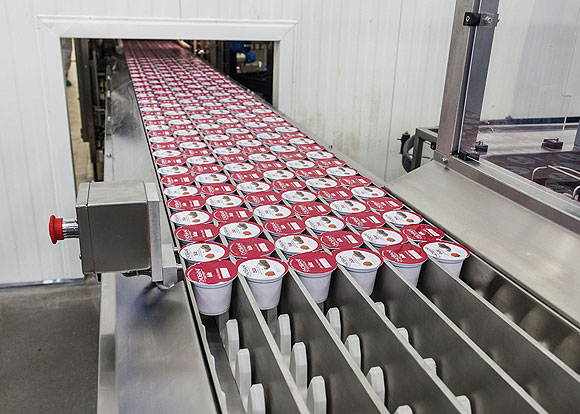REDMOND, Wash. — March 19, 2013 — When Chobani’s operations began in a shuttered factory in 2005, its founder, Hamdi Ulukaya, had no idea the company would rapidly become the No. 1-selling yogurt brand in the United States. He simply wanted to create a delicious, high-quality product for consumers. At the time, Chobani’s original five employees used just one truckload of milk each day to make their tasty product. Today, the company needs enough trucks to ship more than 2 million cases of yogurt each week between its two production facilities in New York and Idaho.
Rapid business growth can be too much of a good thing unless you have the proper technology to keep up with the high-speed pace of sales.
As a startup, Chobani had limited IT resources in place, and employees did most of the production and customer tracking work in Microsoft Excel. This approach was fine when the company was small; however it quickly became insufficient as the staff size skyrocketed to more than 2,200 employees who process more than 2 million pounds of yogurt daily and contribute to roughly US$1 billion in annual sales in the United States, Australia and the United Kingdom.
To sustain — and ideally even surpass — this rate of growth, executives knew they needed to implement a robust business solution to provide inventory control as well as supply chain and warehouse management. They went looking for a system that was easy to use and could scale with the pace of their business. Most important, the system needed to allow the staff to remain focused on ensuring the production of high-quality, authentic, strained Greek yogurt.
“At Chobani, we’re focused on making one cup of quality yogurt at a time,” said Maureen A. Hurley, vice president of information technology at Chobani. “We guide all of our decision-making processes — from milk selection to IT solutions — on the desire to lead and grow while keeping things simple, efficient and focused on producing the perfect cup each and every time.”
After researching a range of options, Chobani selected Microsoft technologies, including Microsoft Dynamics AX and Microsoft Dynamics CRM, to meet the needs of its people and keep pace with its aggressive plans for future growth.
The Chobani team especially liked the flexibility Microsoft business solutions enables, since workers can roll out new modules swiftly and add functionality over time as needed. The system is used throughout the company to review production numbers and distribution levels to more deeply understand and analyze the company’s performance and current business challenges.
“Microsoft Dynamics AX lets us track the entire process of transforming milk and cultures into fresh yogurt — from the processing facility to distribution channels and, finally, right to grocery store shelves,” Hurley said.
As a result of implementing Microsoft Dynamics AX, Chobani experienced lower production costs, inventory control and reduced employee workloads. The company had its state-of-the-art processing plant in Idaho, the largest of its kind at 1 million square feet, up and running on Microsoft Dynamics AX in just 27 days, which helped increase shipment speed to various distribution locations.
Another large portion of Chobani’s success stems from its interaction with consumers, which Microsoft Dynamics helped enhance.
“As our company grew, so did the volume of messages from consumers across the world. We receive hundreds of contact messages and phone calls daily,” Hurley said. “Microsoft Dynamics CRM has enabled us to make that feedback actionable, to better track and understand what our customers want, and to continue to provide best-in-class service. This has helped us build deeper, more immediate connections with our fans and continue our growth.”
Further, the business suite has helped the company get beyond the online space and connect with customers face to face. Chobani SoHo, a one-of-a-kind Mediterranean yogurt bar in New York, invites customers to experience an artisanal menu starring fresh Chobani. In 2010, Chobani launched the CHOmobile, a truck that samples the company’s products at various events across the U.S.
“Our CHOmobile travels to festivals and events, delivering hundreds of thousands of cups of our freshest yogurt directly to customers,” Hurley said. “We can then track these interactions in Microsoft Dynamics CRM to see a complete picture of our customers’ preferences and habits.”

Chobani’s customer loyalty team works directly with customers, using Microsoft Dynamics CRM to track nutritional inquiries, complaints, coupon requests, product donation requests, recipe submissions and more. The Microsoft Dynamics solution gives Chobani employees crucial feedback, helping them understand what customers want and better connect with them to continue providing exceptional service.
“We are very passionate about our commitment to deliver beyond what we produce. Our philosophy is ‘nothing but good.’ And we live those words every day,” Hurley said. “Nothing but good is what we say; that’s what we deliver. It guides who we are as people, as employees and as a corporation.”
The “nothing but good” philosophy also drives Chobani’s employees to give back to local communities whenever they can. Despite its rapid growth, Chobani has stayed true to its roots, giving 10 percent of its profits to individuals working toward positive, long-lasting change through its Shepherd’s Gift Foundation.
This morning at the Microsoft Dynamics Convergence 2013 conference in New Orleans, Chobani discussed the ways in which its technology suite has helped the company grow while maintaining its commitment to quality, customer satisfaction and community involvement.
“Microsoft Dynamics has contributed to our success and consistent growth,” Hurley said. “We can’t wait to see how it keeps us one step ahead as our business continues to flourish.”






